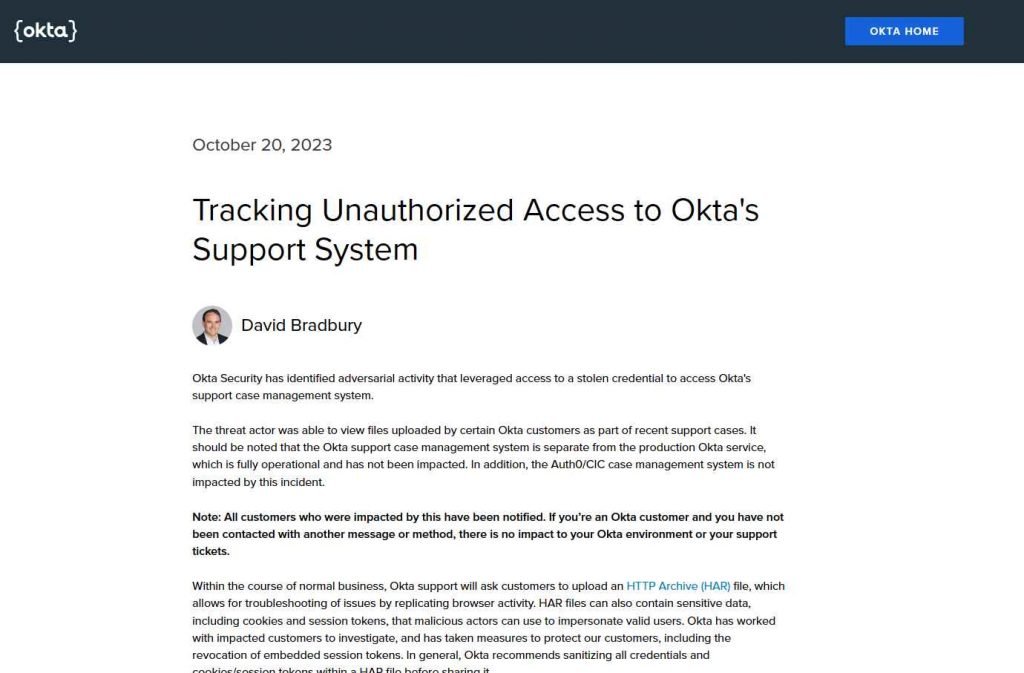The recent Okta breach has raised concerns within the cybersecurity community. On October 20, 2023, Okta, a provider of identity services like multi-factor authentication and single sign-on, disclosed a security breach that involved unauthorized access to its customer support system. The incident came to light when hackers leveraged a stolen credential to infiltrate Okta’s support case management system, where they could view files uploaded by certain customers for troubleshooting purposes. These files, typically HTTP Archive (HAR) files, are sensitive as they can contain customers’ cookies and session tokens, which could be exploited to impersonate valid users.

1. Nature of the Breach
- Okta’s support system was compromised in a security breach. Hackers were able to break into its support case management system and steal sensitive data. This data could potentially be used to impersonate valid users.
2. Detection and Notification
- BeyondTrust, a cybersecurity firm, detected an identity-centric attack on an in-house Okta administrator account. They notified Okta of the breach on October 2, 2023.
3. Affected Parties
- BeyondTrust was identified as one of the customers affected by this breach. The breach had an internal impact on Okta, affecting its security leadership and other operational aspects.
4. Method of Attack
- The attackers breached Okta’s support system using stolen credentials. This allowed them unauthorized access to sensitive customer data and internal resources.
5. Market Impact
- Following the news of the cyber breach, Okta’s shares experienced a significant slump. This reflects the market’s reaction to the security incident and its potential implications .
6. Official Statements
- Okta’s security leadership has confirmed the breach, acknowledging the compromise of their internal systems and the impact on their customers.
The fallout from the breach saw a slump in Okta’s shares and an approximate 1% of Okta’s customers being affected, although Okta did not disclose the exact number of affected customers. This incident also casts a spotlight on Okta’s security measures, especially coming after a similar breach in 2022 where hackers managed to steal some of Okta’s source code and gained access to the company’s internal network.
Below is a summary of known breaches:
- Lapsus$ Incident (January 2022): In January 2022, Okta suffered a breach when a hacking group known as Lapsus$ infiltrated its third-party support provider, Sitel. Okta faced criticism for not disclosing the breach promptly.
- Source Code Theft: In an undisclosed timeline, Okta confirmed a major security incident where a hacker accessed its source code following a breach of its GitHub repositories.
- January 2022 Data Breach: A separate incident in late January 2022 was confirmed by Okta CEO Todd McKinnon, where some customer data might have been exposed. The exact details of this breach were not provided.
- October 20, 2023 Breach: Hackers gained unauthorized access to Okta’s support case management system and stole sensitive data that could be used to impersonate valid users on October 20, 2023.
- Lapsus$ Incident (Undisclosed Date): In a different encounter with Lapsus$, hundreds of Okta customers were possibly affected by a security breach, and Okta faced backlash for its slow response to the incident.
These incidents reflect the challenges even established identity management providers face in ensuring the security and privacy of their systems and customer data.
The breach is a stark reminder of the sophisticated threats that modern enterprises face, and the critical importance of robust cybersecurity measures to safeguard sensitive data and systems from unauthorized access. The breach at Okta underscores the vulnerabilities that even identity services providers face in the realm of cybersecurity. The incident has led to the compromise of sensitive data, affecting both Okta and its customers, and has had noticeable market repercussions.

Information security specialist, currently working as risk infrastructure specialist & investigator.
15 years of experience in risk and control process, security audit support, business continuity design and support, workgroup management and information security standards.











